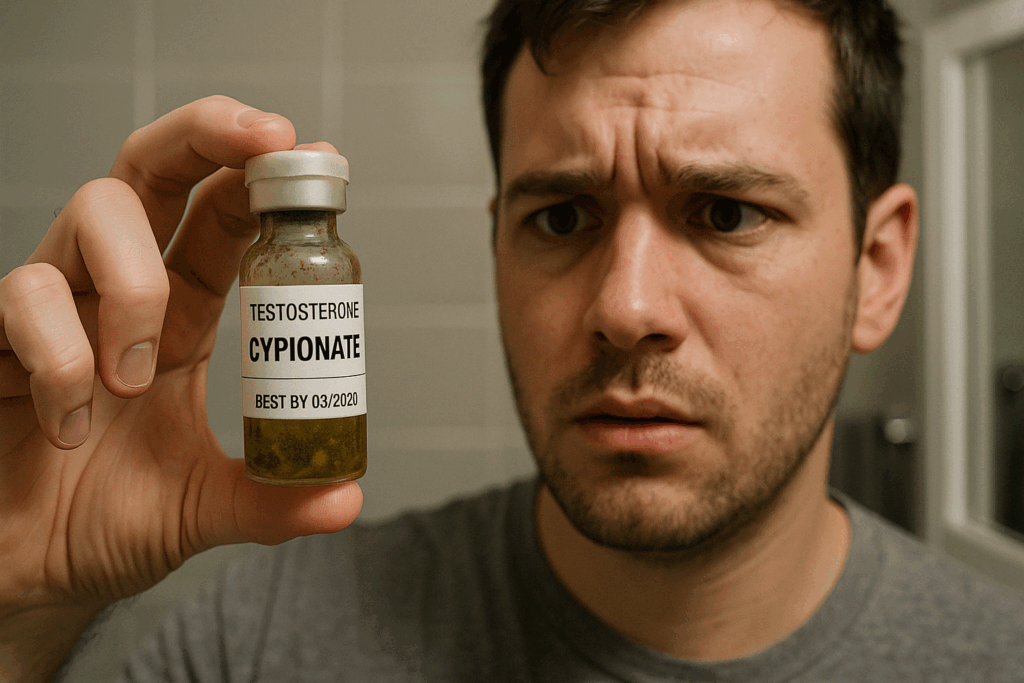Expired Testosterone: Safety Guide and Potential Side Effects

Last Updated On April 21, 2025
Introduction
You’re down to your last vial of testosterone, and you notice it expired a few months ago. Should you use it or toss it? This common dilemma faces many TRT patients who don’t want to miss their next dose but worry about safety. While medical professionals always advise against using expired medications, the reality is more complex when it comes to testosterone.
This article explores what actually happens when testosterone expires, the potential risks, and practical guidelines based on scientific evidence and real-world experiences.
What Happens When Testosterone Expires?
Chemical Changes in Expired Testosterone
When testosterone expires, its chemical stability doesn’t suddenly vanish overnight. Unlike some medications that quickly break down, testosterone esters (like cypionate and enanthate) remain relatively stable molecules. However, over time, the chemical composition can gradually change, which may affect its potency and effectiveness for hormone replacement therapy.
The manufacturer’s expiration date isn’t arbitrary—it represents the timeframe during which they guarantee full potency and safety. After this date, the testosterone may still be active, but its therapeutic effectiveness might gradually decline.
Carrier Oil Degradation: The Real Concern
Pharmaceutical research shows that the primary issue with expired testosterone isn’t usually the hormone molecule itself, but rather the carrier oil it’s suspended in. Different carrier oils have varying stability profiles – some oils like MCT (medium-chain triglycerides) demonstrate greater resistance to oxidation compared to seed oils such as cottonseed, grapeseed, or sesame oil, which are more prone to degradation over time.
When exposed to unfavorable conditions, “high temperatures can degrade the testosterone, the cypionate ester, and/or the carrier oil – all of which can reduce the testosterone’s effectiveness.” This degradation process, known as oxidation, involves chemical changes in the carrier oil that can lead to various side effects when injected.
I’ve personally experienced this first-hand, which I wrote about here. About six months ago, I had three injections in a row where I experienced severe coughing spells after my testosterone injection. This had rarely happened before, so I knew something was wrong.
I checked my testosterone vials and found I had accidentally mixed an old pack of testosterone ampoules among my newer ones. The expired vials were a couple of months past their expiration date. After switching to the newer batch, the coughing symptoms disappeared completely.
This experience aligns with what we know about carrier oils—they can degrade over time, potentially causing irritation, inflammation, or post-injection reactions. Different products use various carrier oils (cottonseed, grapeseed, sesame oil), each with its own degradation timeline.
Potential Risks of Using Expired Testosterone

Post-Injection Reactions
The degraded carrier oil in expired testosterone can lead to several potential reactions:
- Coughing spells (what I experienced)
- Tissue irritation at the injection site
- Inflammation or pain
- Feeling of warmth or flushing
These reactions happen because the degraded oil can irritate the lung tissue if it enters the bloodstream or cause local tissue irritation at the injection site.
Efficacy Concerns
Beyond the immediate physical reactions, expired testosterone may also present efficacy issues:
- Reduced potency, leading to suboptimal hormone levels
- Unstable hormone levels between injections
- Inconsistent therapeutic effects
- Poor symptom control
These changes could potentially affect your TRT results and symptom management.
Contamination Risks
Another concern with expired medications is the potential for contamination:
- Bacterial growth becomes more likely over time, especially in opened vials
- Compromised preservatives may no longer effectively prevent microbial growth
- Risk of infections from contaminated injections
While these risks are relatively low with proper storage, they do increase with time beyond expiration.
Factors Affecting Testosterone Shelf Life
Storage Conditions Matter
How you store your testosterone significantly impacts how quickly it degrades:
- Temperature: Store precisely between 68-77°F (20-25°C) – NOT colder or warmer. Temperatures below 68°F can cause crystallization, while temperatures above 77°F accelerate degradation
- Light exposure: Keep vials protected from direct light, which can accelerate degradation
- Humidity: Avoid storing in bathrooms or other humid environments
Proper storage can extend the viable life of testosterone, while poor conditions can cause it to degrade even before the official expiration date.
Type of Testosterone Preparation
Different testosterone formulations have varying shelf lives:
- Testosterone cypionate and enanthate typically have expiration dates 1-2 years from manufacturing
- Once a vial is opened, it should technically be used within 28 days according to official guidelines
- Multi-dose vials typically contain preservatives that single-use ampoules don’t have
Real-World Approach to Expired Testosterone
The Practical Reality vs. Official Guidelines
Medical professionals will always advise against using expired medications—and for good reason. However, the practical reality many TRT users face is more nuanced:
- Most testosterone doesn’t immediately become dangerous the day after expiration
- The carrier oil degradation happens gradually over time
- Many users report using testosterone 1-3 months past expiration with no issues
- The further past expiration, the higher the risk of side effects or reduced potency
Signs Your Testosterone Has Actually Gone Bad
Instead of relying solely on the date, you can inspect your testosterone for signs of degradation:
- Visual changes: Look for cloudiness, particles, crystallization, or color changes
- Unusual resistance when drawing: May indicate crystallization or thickening
- Pain or unusual reactions after injection: Like the coughing I experienced
- Poor results from your treatment: Symptoms of low testosterone returning despite treatment
If you notice any of these signs, it’s time to dispose of the medication regardless of the expiration date.
Preventing Future Expiration Issues
Supply Management Strategies
To avoid being caught with expired testosterone in the future:
- Keep track of expiration dates when receiving new vials
- Use a “first in, first out” system (use oldest vials first)
- If possible, maintain at least a month’s extra supply
- Don’t stockpile excessive amounts that might expire before use
I’ve learned to always check dates when receiving new testosterone and organize my vials accordingly. This has prevented further issues with accidentally using expired medication.
Conclusion
While expired testosterone doesn’t instantly become dangerous, the risks of carrier oil degradation, reduced potency, and potential contamination increase over time. My personal experience with coughing reactions from expired testosterone showed me that these concerns are real and worth taking seriously.
The safest approach is always to use medication within its expiration period. However, if you find yourself with expired testosterone, being able to evaluate its condition and understand the potential risks allows you to make an informed decision while working to establish a more reliable supply.